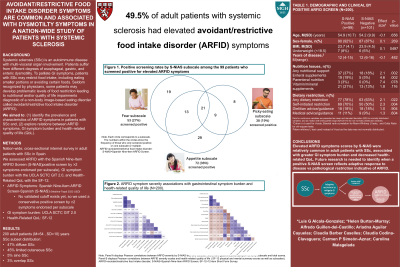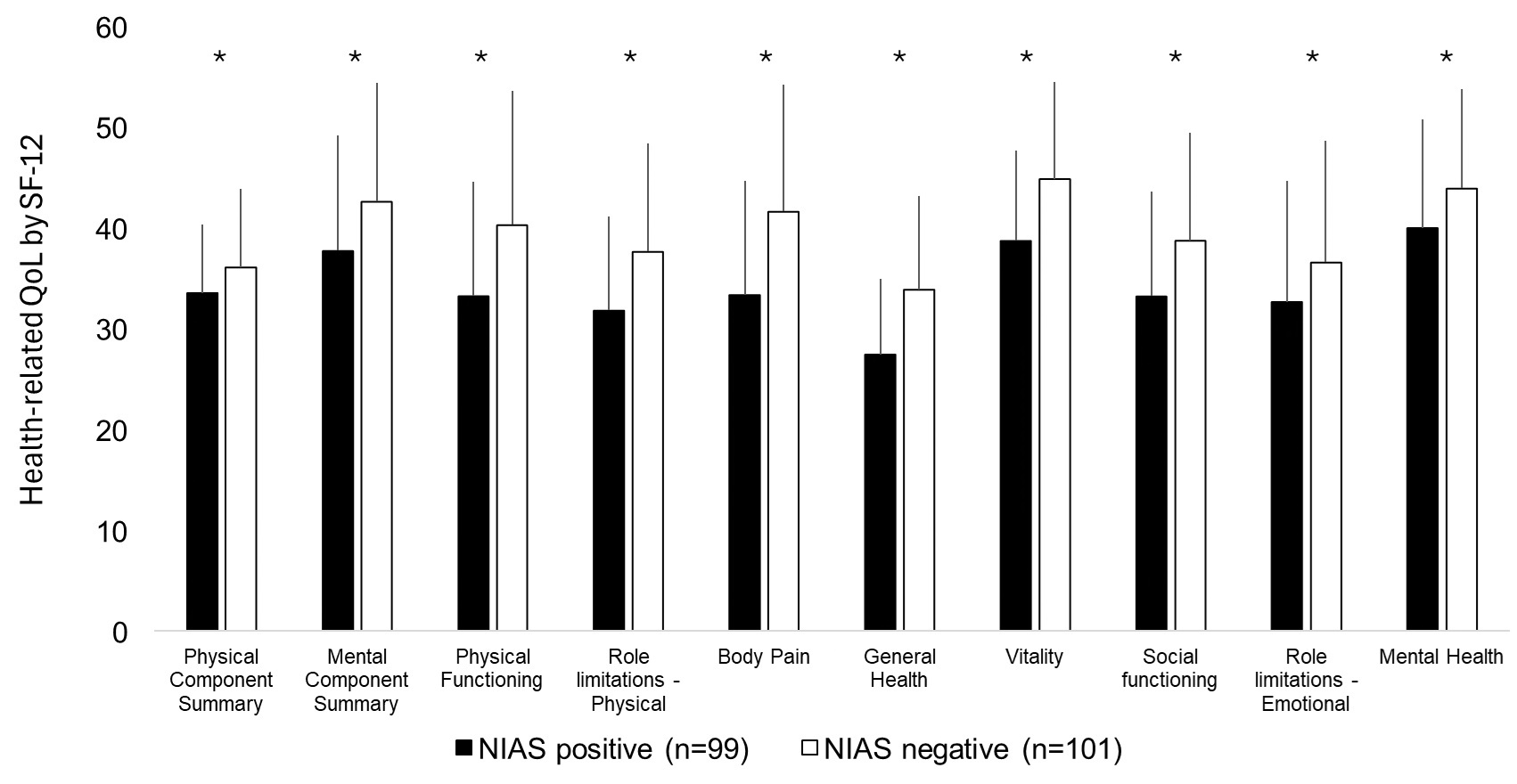Sunday Poster Session
Category: Stomach
P1621 - Avoidant/Restrictive Food Intake Disorder (ARFID) Symptoms are Common and Associated With Upper Dysmotility Symptoms in a Nationwide Study of Patients With Systemic Sclerosis
Sunday, October 27, 2024
3:30 PM - 7:00 PM ET
Location: Exhibit Hall E

- HB
Helen Burton Murray, PhD
Center for Neurointestinal Health, Massachusetts General Hospital
Boston, MA
Presenting Author(s)
Luis G. Alcala-Gonzalez, MD1, Helen Burton-Murray, PhD2, Alfredo Guillen-del-Castillo, MD3, Ariadna Aguilar Cayuelas, 3, Claudia Barber Caselles, MD3, Claudia Codina-Clavaguera, MD3, Carmen Simeón-Aznar, 4, Carolina Malagelada, MD3
1Vall Hebron University Hospital, Barcelona, Catalonia, Spain; 2Center for Neurointestinal Health, Massachusetts General Hospital, Boston, MA; 3Vall d’Hebron University Hospital, Barcelona, Catalonia, Spain; 4Vall d’Hebron University Hospital, Barcelona, Cantabria, Spain
Introduction: Systemic sclerosis (SSc) is an autoimmune disease with multi-visceral organ involvement, with patients suffering from different degrees of esophageal, gastric, and enteric dysmotility. To palliate GI symptoms, patients with SSc may restrict food intake, including eating smaller portions or avoiding certain foods. Seldom recognized by physicians, some patients may develop problematic levels of food restriction leading to nutritional and/or quality of life impairments diagnostic of a non-body image-based eating disorder called avoidant/restrictive food intake disorder (ARFID). We aimed to: (1) identify the prevalence and characteristics of ARFID symptoms in patients with SSc and, (2) explore relations between ARFID symptoms, GI symptom burden and health-related quality of life (QoL).
Methods: We conducted a nation-wide, cross-sectional internet survey in adult patients with SSc in Spain. We assessed ARFID with the Nine-Item ARFID Screen (NIAS; positive screen by >2 symptoms endorsed per subscale), GI symptom burden with the UCLA SCTC GIT 2.0, and Health-Related QoL with the SF-12.
Results: 200 adult patients were included, 54±10 years old and 89% female. SSc subset distribution was 47% diffuse SSc, 45% limited cutaneous SSc, 5% sine SSc and 3% overlap SSc. 99 (49.5%) patients screened positive for one or more ARFID subscales (38% on Picky eating, 27% Fear, and 36% Appetite). Higher ARFID symptoms scores were moderately and significantly associated with worse GI symptom burden, except reflux and constipation, and negatively associated with decreased Health related QoL (Table 1). The specific GI symptoms most strongly associated with ARFID symptoms were: upper GI tract symptoms including early satiety (r=.456), dysphagia (r=.419) and nausea (r=.353). Lastly, those who screened positive for ARFID had decreased HrQoL in both the mental and physical component summary, as well as all 8 subscales of HrQoL by SF-12 compared to those that screened negatively (all p< .05; Figure 1).
Discussion: In patients with SSc, positive ARFID screen by NIAS was notably common. ARFID symptoms were associated with greater GI symptom burden and with decreased HrQoL. Future research with diagnostic interviews is needed to identify when a positive screen for ARFID reflects an adaptive response to disease or true ARFID that would warrant behavioral treatment.

Note: The table for this abstract can be viewed in the ePoster Gallery section of the ACG 2024 ePoster Site or in The American Journal of Gastroenterology's abstract supplement issue, both of which will be available starting October 27, 2024.
Disclosures:
Luis G. Alcala-Gonzalez, MD1, Helen Burton-Murray, PhD2, Alfredo Guillen-del-Castillo, MD3, Ariadna Aguilar Cayuelas, 3, Claudia Barber Caselles, MD3, Claudia Codina-Clavaguera, MD3, Carmen Simeón-Aznar, 4, Carolina Malagelada, MD3. P1621 - Avoidant/Restrictive Food Intake Disorder (ARFID) Symptoms are Common and Associated With Upper Dysmotility Symptoms in a Nationwide Study of Patients With Systemic Sclerosis, ACG 2024 Annual Scientific Meeting Abstracts. Philadelphia, PA: American College of Gastroenterology.
1Vall Hebron University Hospital, Barcelona, Catalonia, Spain; 2Center for Neurointestinal Health, Massachusetts General Hospital, Boston, MA; 3Vall d’Hebron University Hospital, Barcelona, Catalonia, Spain; 4Vall d’Hebron University Hospital, Barcelona, Cantabria, Spain
Introduction: Systemic sclerosis (SSc) is an autoimmune disease with multi-visceral organ involvement, with patients suffering from different degrees of esophageal, gastric, and enteric dysmotility. To palliate GI symptoms, patients with SSc may restrict food intake, including eating smaller portions or avoiding certain foods. Seldom recognized by physicians, some patients may develop problematic levels of food restriction leading to nutritional and/or quality of life impairments diagnostic of a non-body image-based eating disorder called avoidant/restrictive food intake disorder (ARFID). We aimed to: (1) identify the prevalence and characteristics of ARFID symptoms in patients with SSc and, (2) explore relations between ARFID symptoms, GI symptom burden and health-related quality of life (QoL).
Methods: We conducted a nation-wide, cross-sectional internet survey in adult patients with SSc in Spain. We assessed ARFID with the Nine-Item ARFID Screen (NIAS; positive screen by >2 symptoms endorsed per subscale), GI symptom burden with the UCLA SCTC GIT 2.0, and Health-Related QoL with the SF-12.
Results: 200 adult patients were included, 54±10 years old and 89% female. SSc subset distribution was 47% diffuse SSc, 45% limited cutaneous SSc, 5% sine SSc and 3% overlap SSc. 99 (49.5%) patients screened positive for one or more ARFID subscales (38% on Picky eating, 27% Fear, and 36% Appetite). Higher ARFID symptoms scores were moderately and significantly associated with worse GI symptom burden, except reflux and constipation, and negatively associated with decreased Health related QoL (Table 1). The specific GI symptoms most strongly associated with ARFID symptoms were: upper GI tract symptoms including early satiety (r=.456), dysphagia (r=.419) and nausea (r=.353). Lastly, those who screened positive for ARFID had decreased HrQoL in both the mental and physical component summary, as well as all 8 subscales of HrQoL by SF-12 compared to those that screened negatively (all p< .05; Figure 1).
Discussion: In patients with SSc, positive ARFID screen by NIAS was notably common. ARFID symptoms were associated with greater GI symptom burden and with decreased HrQoL. Future research with diagnostic interviews is needed to identify when a positive screen for ARFID reflects an adaptive response to disease or true ARFID that would warrant behavioral treatment.

Figure: Figure 1: Comparison of QoL by SF-12 Scores are standardized. A score below 50 reflects worse HrQoL compared to the average of the general Spanish population. *p < 0.05
Note: The table for this abstract can be viewed in the ePoster Gallery section of the ACG 2024 ePoster Site or in The American Journal of Gastroenterology's abstract supplement issue, both of which will be available starting October 27, 2024.
Disclosures:
Luis Alcala-Gonzalez indicated no relevant financial relationships.
Helen Burton-Murray indicated no relevant financial relationships.
Alfredo Guillen-del-Castillo indicated no relevant financial relationships.
Ariadna Aguilar Cayuelas indicated no relevant financial relationships.
Claudia Barber Caselles indicated no relevant financial relationships.
Claudia Codina-Clavaguera indicated no relevant financial relationships.
Carmen Simeón-Aznar indicated no relevant financial relationships.
Carolina Malagelada indicated no relevant financial relationships.
Luis G. Alcala-Gonzalez, MD1, Helen Burton-Murray, PhD2, Alfredo Guillen-del-Castillo, MD3, Ariadna Aguilar Cayuelas, 3, Claudia Barber Caselles, MD3, Claudia Codina-Clavaguera, MD3, Carmen Simeón-Aznar, 4, Carolina Malagelada, MD3. P1621 - Avoidant/Restrictive Food Intake Disorder (ARFID) Symptoms are Common and Associated With Upper Dysmotility Symptoms in a Nationwide Study of Patients With Systemic Sclerosis, ACG 2024 Annual Scientific Meeting Abstracts. Philadelphia, PA: American College of Gastroenterology.

